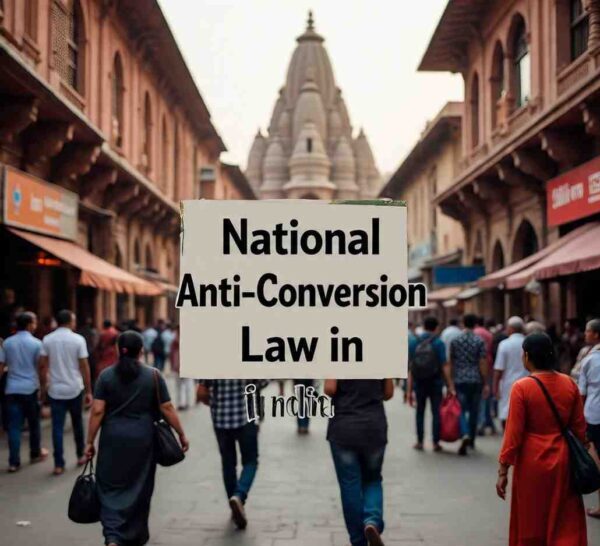Explore the proposed National Anti-Conversion Law in India, its legal implications, connection to Article 25, and the controversy surrounding forced religious conversions and “love jihad.”
Introduction
India, a secular country with a rich tapestry of religions, has long grappled with the issue of religious conversions. Recently, the debate reignited when a Member of the Legislative Assembly (MLA) formally urged the Union Law Minister to introduce a National Anti-Conversion Law. The proposal aims to curb alleged incidents of forced or fraudulent religious conversions, often associated with terms like “love jihad” or sham marriages. This request marks a significant push toward creating uniformity in anti-conversion regulations across the country.
In this article, we explore the legal, social, and political implications of such a law and the controversies it invites.
What is the National Anti-Conversion Law Proposal?
The National Anti-Conversion Law is a proposed central legislation that would regulate religious conversions across all Indian states. The request to the Union Law Minister calls for:
- Stringent penalties for forced or fraudulent conversions.
- Uniform legal standards across states.
- Central oversight to monitor and enforce the law.
The central idea is to prevent individuals or groups from converting people from one religion to another through coercion, fraud, inducement, or deceit—especially through emotionally charged methods like false marriage promises.
Why the Demand Now?
The current push stems from ongoing reports—particularly from conservative political and religious groups—alleging a rise in deceptive practices targeting individuals for religious conversion. Some state governments have already passed laws addressing this issue, but critics argue that the lack of a national law leaves room for loopholes and legal inconsistencies.
In his letter to the Union Law Minister, the MLA cited “disturbing cases of conversion through fraudulent marriages, coercion, and undue influence”, arguing that the matter transcends state boundaries and needs a uniform legal approach.
Existing State Laws on Religious Conversion
As of now, several Indian states, including Uttar Pradesh, Madhya Pradesh, Himachal Pradesh, Gujarat, and Uttarakhand, have enacted their anti-conversion laws. These laws generally:
- Mandate prior notification to district authorities before conversion.
- Allow authorities to investigate motives behind conversions.
- Impose penalties ranging from 3 to 10 years in prison for unlawful conversions.
However, these laws vary significantly in terms of definitions, procedures, and penalties. A national law would aim to standardize these across the board.
Legal and Constitutional Concerns
The proposal for a nationwide anti-conversion law raises important constitutional questions, particularly related to:
1. Freedom of Religion (Article 25)
Article 25 of the Indian Constitution grants every citizen the freedom to profess, practice, and propagate their religion. Critics contend that anti-conversion laws could violate this fundamental right by imposing restrictions on voluntary religious conversions.
2. Federalism and State Rights
Law and order are primarily state subjects under the Constitution of India. Enacting a central law in an area already regulated by states could lead to jurisdictional conflicts.
3. Burden of Proof
Most state anti-conversion laws shift the burden of proof onto the person converting or the person who performed the conversion. A national law with similar provisions may be challenged for reversing the principle of “innocent until proven guilty.”
The “Love Jihad” Controversy
One of the most controversial aspects tied to anti-conversion efforts is the term “love jihad.” This refers to a conspiracy theory that Muslim men allegedly convert Hindu women to Islam under the guise of love and marriage.
While proponents of a national law cite such cases as justification, opponents argue that “love jihad” is not a legally recognized term and that it unfairly targets interfaith couples and minority communities. They view it as a way to police personal relationships rather than a genuine effort to prevent coercion.
Impact on Minority Rights
The potential law has generated fear among religious and linguistic minorities, who worry it could be used to:
- Harass voluntary converts, especially those from vulnerable communities.
- Target minority religious leaders, missionaries, and charitable organizations.
- Suppress religious freedom and expression, especially in tribal and rural areas.
Human rights organizations have warned that similar state laws have already led to wrongful arrests, social polarization, and communal tension.
Political and Public Response
While several right-wing parties and religious groups have supported the idea of a national anti-conversion law, opposition parties, civil rights activists, and secular organizations have criticized it as politically motivated and constitutionally problematic.
Public opinion is deeply divided, reflecting the larger tensions between religious freedom and national identity.
Conclusion
The call for a National Anti-Conversion Law has reignited longstanding debates about religious freedom, minority rights, and the role of the state in personal matters. While the law’s supporters claim it will curb forced conversions and bring legal clarity, critics warn of its potential misuse to target minority communities and infringe upon fundamental rights.
As the Union Law Ministry considers this proposal, the need for a balanced, rights-respecting legal framework becomes paramount. Only a transparent, consultative legislative process can ensure that such a law—if passed—does not compromise the core constitutional values of secularism and individual liberty that define the Indian Republic.

























